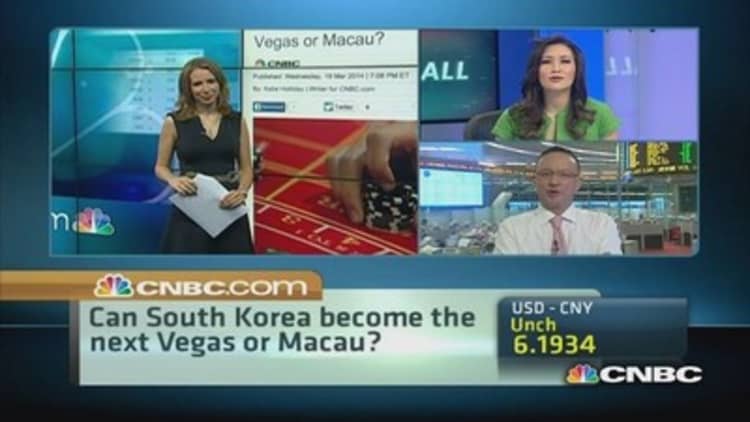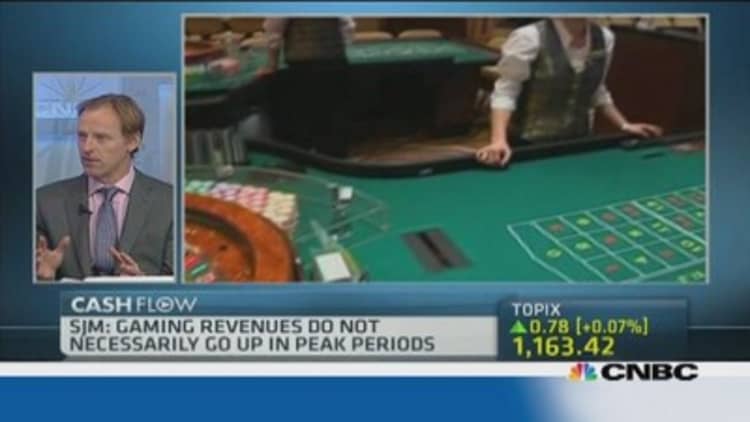Casino companies are reaching out to some of Asia's furthest corners to build their latest projects, but their bullish forecasts are counting on Chinese tourists' wandering feet.
"Everybody's counting on Chinese tourists," noted Bharat Joshi, investment manager at Aberdeen. "Chinese gamblers do travel and they follow the junkets and wherever the junkets have a credit line."
(Read more: Can South Korea become the next Vegas or Macau?)
He believes the frontier casinos offer opportunities, especially since gamblers like playing in new casinos, often queuing up at openings.
"It's very similar to golf courses. You want to play on different greens," Joshi said.
The new frontiers include Vladivostok, a mere two-hour flight from Beijing, as well as Manila and Cambodia, which require around four hours travel time from China.

Growth forecasts are certainly bullish: Citigroup forecasts Vladivostok's gross gaming revenue, or GGR, will climb to $1.7 billion by 2020, from an estimated $410 million in 2016, and it expects Manila's GGR will rise at a 16 percent compound annual growth rate to $5.8 billion by 2020.
That's relatively small compared with mature market Macau, with around $55 billion in GGR expected this year, according to Citigroup's data. But the bank is bullish on the three frontier gaming market leaders – Summit Ascent, Melco Crown Philippines and Nagacorp – for their projects' close proximity to China, favorable visa policies for mainland tourists and strong arrival growth.
(Read more: Gamblers lost a record $440B in 2013, and may not slow down)
To be sure, gambling may be the ultimate in discretionary spending, and it can be the first expense to get cut by worried consumers.
China faces concerns about its slowing economic growth as well as crackdowns on corruption, which are spurring many consumers to shun the appearance of conspicuous consumption.
(Read more: Vietnam bets on loosening gaming laws to lure high rollers)
These bullish forecasts for frontier casinos really depend on "how much money people have to be playing around with and how much do people want to get money out of China," said Freya Beamish, an economist at Lombard Street Research.
She noted that due to restrictions on the China's capital account, gambling has become one of the ways people move money out of the country.

Amid the mainland's round of reforms in the financial system, Beamish expects China will open its capital account more quickly than many are currently anticipating.
"Illicit flows out of China will be liberalized," she said. "That particular demand for going to the casino may be diminished."
Beamish is also skeptical of China's much-touted shift toward consumer-led growth from an investment-led economy.
(Read more: And the next driver for Japan stocks is…)
"It won't necessarily happen in a successful way," she said. "Investment is very weak and private consumption is by default the strongest thing in the economy," she added, noting she expects economic growth may slow to around 5 percent this year as well as in years ahead, compared with an official target of around 7.5 percent.
"You're going to have a similar amount, or less, of private consumption, but private consumption is leading growth," she said.
(Read more: Sleepy island wants to cash in on China's gambling addiction)
Of course, frontier casino markets may be able to profit even if the hoped-for Chinese tourists don't materialize.
Gaming in Asia is underpenetrated, Macquarie said in a report in December, citing a growing number of high-net-worth individuals and a growing acceptance of integrated casino resorts as a form of entertainment.
For example, it believes the Philippines' domestic market is also promising and its forecast for gaming growth there may be more bullish than Citigroup's; Macquarie forecasts the gaming market may grow to $4.8 billion by 2017.
"Not only is the Philippines seeing strong economic growth, but the demographics are also supportive of higher disposable incomes and greater growth in consumption expenditure," it said, although it noted competition in the market is intense.
—By CNBC.Com's Leslie Shaffer; Follow her on Twitter @LeslieShaffer1

